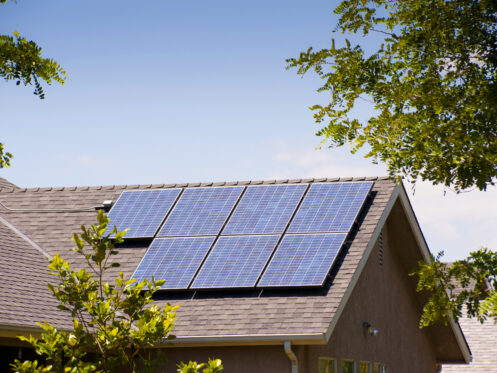Solar energy has been a top contender in the world’s search to reduce our reliance on fossil fuels. Harnessing the power of the sun to produce energy that can be utilized for household needs is a great way to help make a difference in our country’s carbon footprint. Even better, homeowners like you can enjoy a plethora of energy savings when you invest in solar panels for your home.
Understanding Solar Panels
You may have driven by the eyesore of large fields of large solar panels and thought, “I don’t want that at my home.” However, solar panels for residences are often barely noticeable. They are usually placed on the roof, and modern designs help them blend in seamlessly.
Each panel is constructed of photovoltaic cells responsible for absorbing the sunlight and transforming it into direct current energy. As part of the solar electricity system, an inverter converts that direct current energy into alternating current energy. This is the most widely used type of power for homes. This electricity then can be used by the household or fed back into the local power grid to supply power to others in the community.
Typical Energy Savings
It’s been shown that solar energy is a significant renewable energy source and allows the average homeowner to reduce their monthly energy bills by up to 62 percent. That can make a whopping difference in a household’s monthly budget. The total amount you can save will highly depend on a number of factors, such as how much sunlight your property gets, the size of your solar panel system, and the overall cost of electricity from your grid.
Calculating the savings is not as simple as giving you a figure that you can expect to save each month on your energy bills. Instead, numerous pieces to the puzzle must be factored into determining your average monthly energy savings. It will also depend on whether your system has a battery to store energy or returns unused energy to the power grid.
Upfront Costs
One of the biggest factors you’ll need to consider when determining your home’s solar energy savings is the upfront cost of installing your solar panel system. These systems can indeed be costly. However, they’re meant to pay for themself over time, thanks to the energy savings you’ll reap from using solar energy instead of energy from your local power grid. Luckily, there is usually financing available on approved credit.
Most homeowners can expect it to take several years to make up the cost of their solar energy system with the money they’re saving. Depending on what you pay for your system, the amount of energy you produce, and how much your electricity costs, you may find you break even every month. What we mean is that your total monthly bills, including the monthly payment for the installation, are the same as before you had solar panels. However, even if you break even, you know you’re doing your part to protect the environment and reduce your carbon footprint. Sometimes, you may come out ahead because the reduction in your electric bill is more than your solar panel payment.
It’s also important to note that investing in a solar energy system can come with some great rebates and incentives for homeowners. At the federal, state, and many times local government levels, you’ll find programs that provide incentives for at least the first year when you purchase this type of system. You’ll want to factor your rebates and tax incentives into the overall price of your solar energy system to get a finalized upfront investment cost.
Should I Have a System Batter?
Not all home solar panel systems have a battery. Instead of storing unused energy, they sell it to the power company. This type of system usually costs significantly less than one that relies on batteries. However, having a battery does have its advantages. Here, we’ll discuss both options.
Net Metering
When you first start reading about solar panels, net metering is one of the most commonly discussed aspects. A special meter reads how much energy you add to the power grid and how much you draw. Without a battery, you’ll rely on the local power grid when your solar energy system isn’t supplying power, such as overnight. Most homeowners note that net metering significantly reduces the cost of their electric bill. It’s important to note that you must set up the net metering equipment to send the power your solar panels generate to your local utility grid.
Battery Storage
While a residential solar panel system with a battery system costs significantly more, it has advantages. First, not all areas offer net metering, so you’re losing unused energy if you don’t have a battery system. Also, some people prefer to live independently and enjoy not having to rely on the power grid.
One of the most significant advantages of a battery system is having stored energy when there’s a power outage in your area. Sometimes, after a significant storm, it might be sunny long before the power is fully restored. You could be one of the few people on your block with lights and AC at night.
Weather
It’s imperative to note that solar power is heavily weather-dependent. If there’s a nasty winter storm or extremely cloudy day, your solar system isn’t going to get as much sunlight as you may have become accustomed to. On these days, you’ll likely need to rely on the power of your local grid system to supply most of your energy needs for the day.
Energy Usage Optimization
Optimizing your power usage is one of the best ways to help boost your monthly energy savings. When running appliances that utilize a lot of electricity, such as your washer or dryer, consider doing so during the daytime. This is when your solar panel will be producing energy from the sun. Avoid running these costly appliances during nighttime when your panels aren’t producing energy because there’s no sunlight.
Doing the Math
It pays to do the math when determining whether investing in solar panels will save you money on your monthly electricity bills. Start by determining the upfront cost of installing the system minus any tax incentives or rebates you qualify for.
With a little calculation, you can determine how much energy you’ll save each month by utilizing your solar-generated power instead of the local power grid. After factoring in net metering and taking out your monthly payment for the upfront costs associated with your solar energy system, you can get a rough estimate of how much money you can save yourself each month by investing in this type of renewable energy source.
Call the Pros Today
Christian Brothers Air Conditioning Plumbing Electrical offers professional solar panel installation for the entire Glendale, AZ region. We can also assist with your plumbing, cooling, heating, electrical, indoor air quality, duct repair, and insulation needs. Give us a call if you’re looking to reduce your carbon footprint and invest in solar energy.










